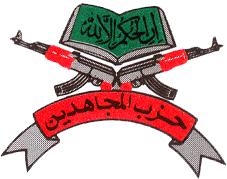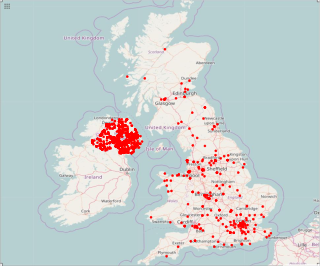Related Research Articles

Jamaat-e-Islami, or Jamaat as it is simply known, is an Islamist political party based in Pakistan and founded by Abul Ala Maududi. It is the Pakistani successor to Jamaat-e-Islami, which was founded in colonial India in 1941. Its objective is the transformation of Pakistan into an Islamic state, governed by Sharia law, through a gradual legal, and political process. JI strongly opposes capitalism, communism, liberalism, and secularism as well as economic practices such as offering bank interest. JI is a "vanguard party", whose members are intended to be leaders spreading party beliefs and influence. Supporters not thought qualified to be members may become "affiliates", and beneath them are "sympathizers". The party leader is called an ameer. Although it does not have a large popular following, the party is quite influential and considered one of the major Islamic movements in Pakistan, along with Deobandi and Barelvi.

Tablighi Jamaat focuses on exhorting Muslims to be more religiously observant and encouraging fellow members to return to practising their religion as per the Islamic Prophet Muhammad, and secondarily give dawah (calling) to non-Muslims. "One of the most widespread Sunni" islah (reform) and called "one of the most influential religious movements in 20th-century Islam," the organisation is estimated to have between 12 and 80 million adherents worldwide, spread over 150 countries, with the majority living in South Asia.

Syed Inzamam-ul-Haq SI, also known as Inzi, is a former Pakistan cricketer and captain of Pakistan national cricket team. He is regarded as one of the best middle-order batsmen of all time. He is the current chief selector of the Pakistan cricket team.
Jamaat ul-Fuqraa' is a terrorist organization mostly based in Pakistan and the United States. Some of the approximately 3,000 members have planned various acts of violence, often directed at rival factions. Two Al-Fuqra members were convicted of conspiring to murder Rashad Khalifa in 1990, and others are alleged to have assassinated Ahmadiyya leader Mozaffar Ahmad in 1983 are the same as Jamaat ul-Fuqra, but this has not been confirmed. These allegations are primarily made by far-right organizations, many who believe the organizations are operating terrorist training camps in the United States. Muslims of America denies any connection.

Hizbul Mujahideen, also spelled Hizb-ul-Mujahideen, is an Islamist militant organization operating in the Kashmir region. Its goal is to separate Kashmir from India and merge it with Pakistan. It is one of the most important players that evolved the narrative of the Kashmir conflict from nationalism to radical jihad.
Jagrata Muslim Janata Bangladesh, is an Islamist extremist group operating in and around northwestern Bangladesh. The Government of Bangladesh has banned the JMJB, classifying it as a terrorist organization. It is described by Bangladeshi police as an offshoot of the related Jamaat-ul-Mujahideen Bangladesh outfit.

Tehreek-e-Jafaria was a Shia political party, which was founded in 1979 by Syed Arif Hussain Al Hussaini. Its creation coincided with the enforcement of controversial Islamic laws by then President of Pakistan, General Mohammad Zia-ul-Haq. At the same time, 1979 Iranian Revolution in Shi'a Iran added extra confidence and comfort in the movement.

ARY QTV, formerly known as Quran Television (QTV), is a Pakistani television channel with a Sunni Islam belief, that produces programs mainly having focus on the Ahlesunnat wal Jamaat. QTV is part of the ARY Digital Network of Pakistan.

Jamaat-ul-Mujahideen is a terrorist organisation operating in Bangladesh. It is listed as a terror group by Bangladesh, India, Malaysia and the United Kingdom. It was founded in April 1998 in Palampur in Dhaka Division by Abdur Rahman and gained public prominence in 2001 when bombs and documents detailing the activities of the organisation were discovered in Parbatipur in Dinajpur district. The organisation was officially declared a terrorist organisation and banned by the government of Bangladesh in February 2005 after attacks on NGOs. But it struck back in mid-August when it detonated 500 small bombs at 300 locations throughout Bangladesh. The group re-organised and has committed several public murders in 2016 in northern Bangladesh as part of a wave of attacks on secularists.

Sipah-e-Sahaba Pakistan, renamed to Millat-e-Islamia and later Ahl-e Sunnat Wal Jamaat (ASWJ), is a Sunni Deobandi Islamist organisation in Pakistan, which also functioned as a political party. It broke away from the main Deobandi Sunni organisation Jamiat Ulema-e-Islam (F) in 1985. It was Established in Jhang by Haq Nawaz Jhangvi, it was banned by President Pervez Musharraf in 2002 as a terrorist organization under the Anti-Terrorism Act of 1997. In March 2012, the government of Pakistan banned Sipah-e-Sahaba again. The government of the United Kingdom banned the group earlier in 2001.

The Jamaat-e-Islami Kashmir or Jamaat-e-Islami Jammu and Kashmir (JIJK) is an Islamic political party based in the city of Srinagar in the Indian administered territory of Jammu and Kashmir. It is distinct from the Jamaat-e-Islami Hind. The organisation's stated position on the Kashmir conflict is that Kashmir is a disputed territory and the issue must be sorted as per UN or through tripartite talks between India, Pakistan and representatives of Kashmir.
Juf or JUF may refer to:

Muḥammad In‘āmul-Ḥasan Kāndhlawī was an Indian Islamic scholar who served as the Chief leader or Amir of the Tablighi Jamaat from 1965 to 1995.

Terrorism in the United Kingdom, according to the Home Office, poses a significant threat to the state. There have been various causes of terrorism in the UK. Before the 2000s, most attacks were linked to the Northern Ireland conflict. In the late 20th century there were also attacks by Islamic terrorist groups. Since 1970, there have been at least 3,395 terrorist-related deaths in the UK, the highest in western Europe. The vast majority of the deaths were linked to the Northern Ireland conflict and happened in Northern Ireland. In mainland Great Britain, there were 430 terrorist-related deaths between 1971 and 2001. Of these, 125 deaths were linked to the Northern Ireland conflict, and 305 deaths were linked to other causes, including 270 in the Lockerbie bombing. Since 2001, there have been almost 100 terrorist-related deaths in Great Britain.
Nizamuddin Markaz, also called Banglewali Masjid, is a mosque located in Nizamuddin West in South Delhi, India. It is the birthplace and global centre of the Tablighi Jamaat, the missionary and reformist movement started by Muhammad Ilyas Kandhlawi in 1926.
Ehsanullah Ehsan is a former spokesman of Tehreek-e-Taliban Pakistan (TTP) and later Jamaat-ul-Ahrar. As a spokesperson of the groups, Ehsan would use media campaigns, social media networks and call up local journalists to claim responsibility for terrorist attacks on behalf of the groups. He was initially a spokesman for the Tehreek-e-Taliban Pakistan (TTP). In 2014, he left TTP after he had developed ideological differences with the TTP leadership following the appointment of Fazlullah as the leader of the group. He later co-founded Jamaat-ul-Ahrar and became its spokesman. In 2015, as a spokesman of Jamaat-ul-Ahrar, he condemned Fazlullah-led Tehrik-e-Taliban attack on a school in Peshawar.
The Difa-e-Pakistan Council is an umbrella coalition of more than 40 Pakistani Political and Religious parties that advocated conservative policies such as closing NATO supply routes to Afghanistan and rejects granting India most-favored nation status.
Ahrar ul Hind was a militant Islamist group in Pakistan that split from the Tehrik-i-Taliban Pakistan (TTP) in February 2014. During peace talks between the Pakistani government and TTP, Ahrar-ul-Hind issued a statement to the media rejecting the talks, and announcing that they would not accept any peace agreement. Following its initial announcement, the group claimed responsibility for a number of attacks in Pakistan, including the Islamabad court attack, before merging into the Jamaat-ul-Ahrar group in August 2014.

Jamaat-ul-Ahrar was a terrorist organization that split away from Tehrik-i-Taliban Pakistan in August 2014. The group came to prominence after it claimed responsibility for the 2014 Wagah border suicide attack. In October 2017, there were unconfirmed reports that Omar Khalid Khorasani, the leader of the JuA, had died from injuries sustained in a US drone strike in Paktia Province, Afghanistan. In August 2020, it merged back to TTP.
References
- ↑ "Jamaat Ul-Furquan (JuF) « Tony Blair". Keeptonyblairforpm.wordpress.com. 2010-03-20. Retrieved 2011-11-08.
- ↑ "Home Office | Home Secretary Moves to 15 Ban Terror Groups". Archived from the original on 2005-12-20. Retrieved 2005-12-20.